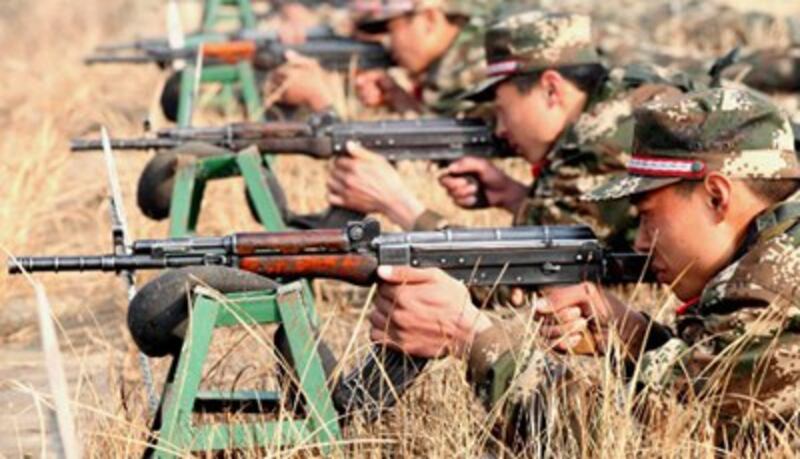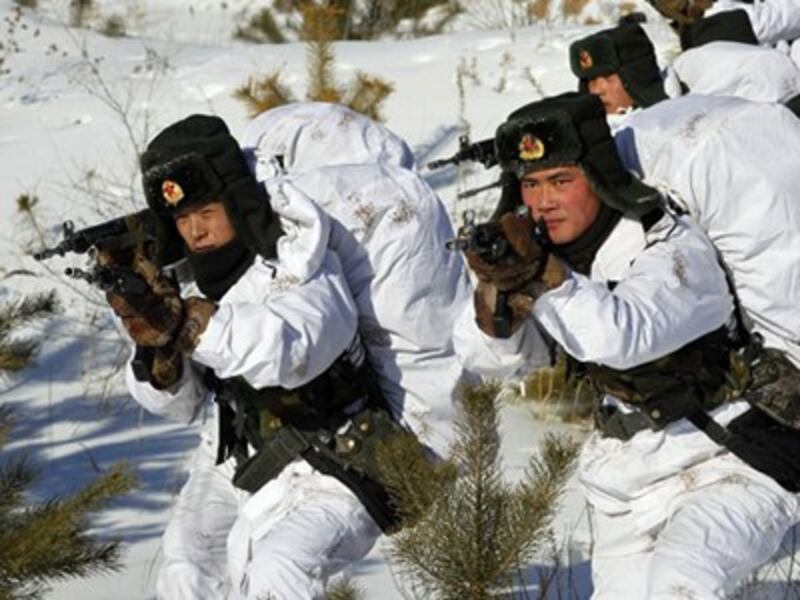China's crackdown on corruption appears to have entered a new stage with a warning from President Xi Jinping that senior military officers will face punishment for any outside income.
On Jan. 17, Xi told "high-ranking military officers" of the People's Liberation Army (PLA) that "any income other than their salaries is strictly forbidden," state media reported.
In his role as chairman of China's Central Military Commission (CMC), Xi said that PLA personnel would be held to stricter anti-corruption standards.
"Any unapproved income or illegal gains will be investigated and punished," said an editorial in the military's PLA Daily, as quoted by the official Xinhua news agency.
The new restriction is a sign that the military will be a key front in Xi's anti-corruption campaign, which has already unsettled cadres of the Communist Party of China (CPC) with punishments of 232,000 officials last year, according to the Central Commission for Discipline Inspections (CCDI).
The number is three times the amount previously reported by the CCDI.
The PLA has been on notice of similar treatment since last June, when the campaign netted its highest-ranking military official, expelling General Xu Caihou from the party on charges that the former CMC vice chairman sold promotions for profit.
On its website last month, the PLA listed 16 senior officers under investigation since last year for "serious discipline violations and legal violations."
New level of scrutiny
The prohibition on any income other than salaries suggests a new level of scrutiny.
"It is pretty clear that the anti-corruption campaign in the PLA is not going to be over any time soon," said David Finkelstein, a retired U.S. Army officer and director of China studies at CNA Corp., a nonprofit research and analysis organization, which operates the government-funded Center for Naval Analyses in Arlington, Virginia.
Finkelstein sees several implications of the crackdown on the PLA.
First is that it will not be treated as "an exceptional institution," with any special exemption from party rules.
Xi's push also reinforces the PLA's role as the "armed wing" of the party under its authority, Finkelstein told RFA.
"The CPC, which commands the army, is resolute in 'purifying' the armed forces," Xinhua said in a commentary.
The enforcement is also "a way to get everyone in line" with pending organizational changes in the military, said Finkelstein.
Perhaps most important, corruption is seen as "debilitating to the PLA's ability to improve its capacity as a war-fighting organization," he said.
The security concerns may be reason enough to ban outside income.
"If the institution you rely on to defend your country is corrupt, you've got a real problem," said Richard Bush, director of the Center for East Asia Policy Studies at the Brookings Institution in Washington.

New discipline
But the new discipline may also point to the PLA's involvement in business dealings, despite an effort to end its role in commercial activities years ago.
According to a separate Xinhua report on the day of Xi's speech to the officers, the PLA pledged in a notice to launch a two-year "operation" against corruption in staff housing projects.
The army has been building affordable housing for personnel since 1999, the report said.
"The notice admitted that some housing projects were built out of budgets and aimed for luxury use. Some were sold to staff at unusually cheap prices and others were sold to civilians," Xinhua said.
Last month, the Falun Gong newspaper Epoch Times linked the income ban to long-standing charges of far more sinister abuses involving the sale of harvested organs for transplants from prisoners at PLA-run hospitals, including from members of the spiritual movement.
In December, The Wall Street Journal said the government had pledged to end organ harvesting from executed prisoners as of Jan. 1, nearly three years after it first announced intentions to stop the practice.
Aside from questions of rights abuses, it is unclear whether the prohibition on extra income is an indicator of pervasive corruption or the extent of PLA involvement in commercial activity.
According to a RAND Corp. study in 1999, the PLA was given the green light by Chinese leader Deng Xiaoping to expand its internal businesses throughout the economy after 1978, making up for military budget cuts of nearly 25 percent.
The PLA interests included telecommunications, hotels, transportation services and light industry, said the study by James Mulvenon and Richard Yang.
Pushback against the military's business empire came in 1998 under President Jiang Zemin with the transfer of PLA commercial assets into non-military holding companies.
"The army and the armed police... shall not carry out any commercial activities in the future," Jiang ordered, according to another Mulvenon paper for the China Leadership Monitor of Stanford University's Hoover Institution in 2001.
Divestiture was driven by many of the same corruption and security concerns as those raised by Xi more than a decade later.
But foot-dragging and backsliding also developed under Jiang as a result of disputes over compensation in budget and salary increases, while some business interests quietly shifted into family members' hands.
The history suggests that the latest PLA anti-corruption drive may be part of a cycle of the military's involvement in commercial activity rather than anything new.
If that is the case, a rerun of the struggle over budgets and salaries can be expected.
"Look to see if PLA salaries are increased," said Bonnie Glaser, senior adviser for Asia at the Center for Strategic and International Studies in Washington.

Sense of entitlement
While corruption may be endemic in the PLA, the party and government, low salaries may help to create conditions for a sense of entitlement.
The government appears to be mindful of the problem on the one hand and concerned about public reaction to official pay raises on the other.
On Jan. 21, the official English-language China Daily reported that President Xi "just got a 62-percent pay hike—to about (U.S.) $22,000 annually (137,500 yuan)." But the paper noted that the salary was only a fraction of those paid to leaders in other countries.
The government appeared to be on the defensive after independent Caixin Online reported that 39 million civil servants would also receive raises of at least 60 percent retroactive to Oct. 1 in connection with pension changes.
Comment sections on the matter in discussions groups were closed, the Associated Press said. It was the first pay hike for civil servants since 2006, state media reports stressed.
Base salaries are only part of officials' compensation with extra funds available for expenses such as housing and travel, the BBC reported.
But even with the increases and benefits, it is unclear whether official salaries will be high enough to break the cycle of PLA involvement in business ventures and displace corruption as a source of income.
In recent weeks, CCDI rules have become increasingly strict, even dictating the maximum size of offices for officials according to rank and whether they may have private toilets, under orders reported by Xinhua on Jan. 24.
If such stringent rules are applied to PLA officers, the result could have unsettling consequences, said Sarah Cook, senior research analyst for East Asia at Freedom House, a Washington-based nongovernmental organization.
"It seems to me like it could be a risky move," Cook said, arguing that governments like China's might be expected to permit outside income for the military in order to maintain loyalty.
"You want them to stay happy, you want them to be loyal and to feel a vested interest in the continuation of the party beyond perhaps just political loyalty and political indoctrination," she said.
For the moment at least, Xi and the CPC seem to be going in the other direction by applying the same rigid anti-corruption rules to the PLA that it has already ordered for civilian cadres.
On Dec. 19, for example, the CMC issued 10 regulations, banning liquor, luxury banquets and red carpets at receptions for high-ranking officers, ordering speakers at meetings to "avoid empty talk" and barring commission officials from attending ribbon-cutting ceremonies.
"Additionally, commission officials are also required to discipline their spouses, children and subordinates and make sure they do not take bribes," Xinhua said.
On Jan. 30, the PLA issued a document affirming its commitment to the "absolute leadership" of the CPC and vowing "zero tolerance" of corruption, state media reported.
